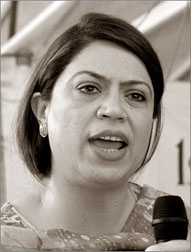Pakistan tribe appeals security
|

Pakistan’s Tourism Minister Nilofar Bakhtiar addresses during a
ceremony in Islamabad, Pakistan on Monday, April 9, 2007. Islamic
clerics at a radical mosque in Pakistan's capital have demanded that
the minister for tourism be fired, after she was pictured committing
a "great sin" by hugging a foreign man. Bakhtiar rejected the
Taliban-style edict against her by clerics at Islamabad's Red
Mosque, who last week set up their own court to deliver Islamic
justice. -AP
|
One of the main tribes in Pakistan's tense border region with
Afghanistan has urged Islamabad to resume control of law and order in
the area. The call from the Ahmadzai Wazirs in South Waziristan came
after weeks of fighting with mostly Uzbek militants.
Pakistan ceded control of security to pro-Taleban militants in the
area after a controversial 2004 peace deal. Critics said it gave Taleban
and al-Qaeda militants a safe haven from which to launch attacks in
Afghanistan. Pakistan's government maintains that most insurgent attacks
in Afghanistan are carried out by militants based in that country.
President Musharraf sent troops into the lawless tribal area to hunt
foreign militants and secure the border after backing the US-led "war on
terror" in 2001. More than 700 Pakistani security personnel have been
killed in fighting in the area since 2002, prompting the government to
negotiate the contentious peace deals.
Under the agreements, troops were to maintain a reduced presence and
tribesmen promised either not to harbour foreign fighters or to ensure
they did not engage in militancy.
But at a meeting on Sunday, the Ahmadzai Wazir tribe reversed the
deal and undertook not to shelter Uzbek militants and their supporters,
most of them signatories of the 2004 deal.
The meeting also announced heavy fines and banishment from the area
for those found to be supporting the Uzbeks, engaging in criminal
activity or blocking development projects initiated by the government.
The government has not yet responded to the tribesmen's appeal, but
admitted publicly last week that troops were backing local Pashtuns
against the Uzbeks.
The tribe dominates the western parts of the South Waziristan agency,
and controls lucrative border trade routes between Afghanistan and
Pakistan. The BBC's M Ilyas Khan in Karachi says recent fighting between
members of the tribe and the Uzbeks is complicated by the fact that some
members of a powerful sub-tribe within the Ahmadzai Wazirs have fought
with the foreigners.
Our correspondent says this makes it difficult for the civil
administration to make a comeback in the area.
The previous system - where the government's writ was implemented by
a political agent through a locally-raised tribal police force and the
paramilitary Frontier Corps (FC) - was undermined when troops were first
sent in and then pulled out, creating an administrative vaccuum, he
says.
Sunday's meeting followed a month-long armed campaign, led by a local
Taleban commander Mullah Nazir who is from the tribe, to evict the
Central Asian militants and their supporters from the region. On
Thursday, President Musharraf admitted publicly for the first time that
the army had helped tribal fighters battling foreign militants near the
town of Wana, in South Waziristan.
The army had until then denied any role in the fighting, saying
locals had risen up to drive out foreigners, among them al-Qaeda and
Taleban fighters. President Musharraf said about 300 foreign militants
had been killed in several weeks of clashes. Local sources put the
figure much lower, at fewer than 100.
The authorities say fighting broke out after tribesmen accused Uzbek
militants of criminal behaviour. But BBC correspondents say the military
may want to highlight the uprising against the Uzbeks because it is
under pressure from the West to move against foreign fighters in the
tribal areas.
BBC |
